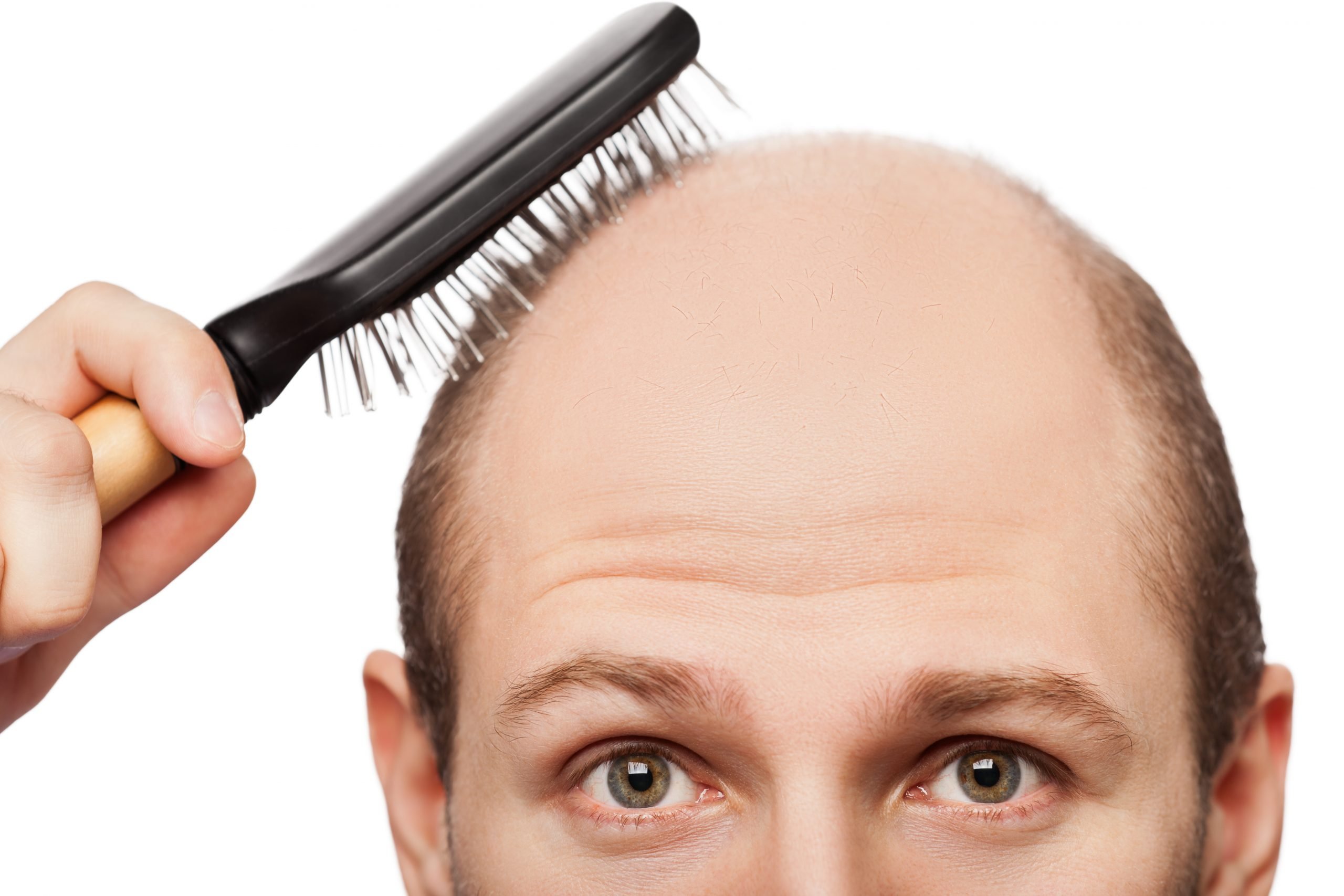
Page Contents
Medical sites like WebMD all agree that you can lose hair from stress. Unfortunately, stress itself can be worrisome, adding more stress to what you feel as your hair falls out. This can cause your hair fall to be even worse, which can stress you more.
In short, stress and hair loss can become a vicious cycle. But what can you do about it? How can you get hair regrowth when you have already started losing your hair due to stress? Let’s look at how stress affects your hair and then what you can do about it.
What Causes Stress-Related Hair Loss?
There are three main ways stress can cause hair loss. These are:
- Telogen effluvium
- Alopecia Areata
- Trichotillomania
The first possibility is the one you usually think of when stress-related hair loss comes to mind. However, the others can be just as bad, sometimes worse, for your hair. So, let’s see these stressful things one at a time.
Telogen Effluvium
Telogen effluvium is the most common reason stress causes hair loss. This one is caused by anything that can stress your body either emotionally or physically.
Some examples that WebMD gives are:
- Childbirth
- Illness
- Fever
- Surgery
- Emotional stress
- Rapid weight loss
The emotional stress mentioned can be caused by a stressful period of time or a single stressful event. The period could be a test coming up, a project at work that isn’t going well, or someone close to you being ill for a while and you have to care for them.

An event that causes stress could be nearly getting kidnapped, being at a bank where a robbery is taking place, or something else. This type of situation doesn’t last for more than a day or two, but it has a high amount of stress.
Whichever type of stress, your hair won’t start falling out until a few months after it is over. However, if you still have stress by the time your hair fall starts, it will only get worse. For this type of hair loss, your hair will either fall out in patches or thin over your whole scalp.
As for rapid weight loss, this is proven to cause stress. According to WebMD, the Journal of Clinical and Diagnostic Research has a 2015 review on how weight loss causes stress on the body. The review lists starvation, crash dieting, and malnutrition as causing telogen effluvium.
Alopecia Areata
Alopecia areata is something that can be triggered by stress, but it is actually an autoimmune condition. This condition is where your immune system attacks the hair follicles in your scalp and causes hair loss.
Unfortunately, it usually hits you without any warning, which can make it very scary. You’ll need to go to your doctor to treat alopecia areata with medications.
Trichotillomania
This is another condition where stress is related to hair loss. Those who have trichotillomania pull their own hair out when they are stressed or dealing with other negative situations. Some type of therapy is usually needed to help with trichotillomania.
In most cases, your hair will start growing back as soon as it stops being pulled out. However, if you continue to pull out your hair for a long time, your follicles may become too damaged to grow any more hair. In this case, the hair you lose is permanent.
How To Regain Hair After Stress
Fortunately, the hair loss that is caused by stress is usually telogen effluvium and is only temporary. This means that your hair will probably grow back all on its own after the stress has passed without you having to do anything about it. This hair regrowth takes several months after you lose your hair, sometimes taking a year or two.
However, especially with telogen effluvium, it is important to identify what is causing you to feel stressed. Once you know this, you can try to stop doing whatever it is that is so stressful.

Unfortunately, if it is your job that is stressful, you probably won’t be able to quit just because it is causing you to lose your hair. This is worse if your stress is triggered repeatedly or for a prolonged time.
When this hair loss goes on for months or years, it leads to chronic telogen effluvium. Fortunately, you can speed up your hair growth to help prevent it from becoming a chronic condition.
Get Plenty Of Nutrients
Two of WebMD’s recommendations for dealing with hair loss caused by stress are to eat a healthy diet and to take a supplement. These are both ways to get the nutrients your hair needs. Specifically recommended are whole grains, lean protein, and plenty of fruits and vegetables.
A study done by the Journal of Drugs and Dermatology in 2016 says that hair loss caused by stress often also causes deficiencies in certain vitamins. These are: Vitamin D, Zinc, Ferritin, and Vitamin B12.
5-Hydroxytryptophan (5-HTP), Vitamin B6, and magnesium are also good supplements to take. 5-HTP helps the body convert tryptophan into serotonin, which is a hormone that can improve your mood and decrease stress.
Vitamin B6 is also used by your body to regulate moods, with low levels being associated with depression and stress. Meanwhile, studies have been done on magnesium that show deficiencies of it can increase stress levels and cause anxiety.
You should either get a multivitamin that has plenty of these or take just these vitamins specifically. Multivitamins meant for hair growth are more likely to have these in them. Even if they don’t, they are still a good way to ensure that your hair is getting what it needs.
Even if you don’t take vitamins, just trying to eat healthier in general can help more than you’d think. This can be difficult if you are a stress eater who likes your comfort foods, but you should at least try it.
Use Hair Growth Products
Hair growth products may not reduce your stress, but they can help your hair grow despite your stress. There are too many to list when it comes to hair growth products you can choose from.
If you don’t want to have to do anything special, you can stick with shampoos and conditioners, which won’t change your normal hair care routine. You can also use serums, foams, hair masks, or other things if you have time.
Even if you don’t start using hair growth products, you should still try to avoid products that have harmful chemicals in them. Your hair is in a fragile state when you are stressed, and products that you have been fine with using before might cause hair loss now.
Take Care Of Yourself
As mentioned, Vitamin D is one of the vitamins you should be getting plenty of if you are stressed. This means getting plenty of sunlight by spending time outdoors. Exercise has clinically been proven to increase endorphins, which decrease stress and help regulate your moods.
Though stress is physical, it is also mental. So, you should be taking care of yourself mentally. Two ways to do this are taking breaks when something is frustrating and connecting with friends or some type of support system.
Along with caring for yourself is also getting plenty of sleep. Adults should get at least 7-9 hours of sleep every night. Rest is especially needed if you are feeling stressed, even though it can be hard to sleep when you are tense.
Try things like going to your bed at the same time every night, drinking an herbal tea before bed, or taking melatonin or something like it. You can also have someone you know give you a massage before bed. A massage will have the added benefit of helping you relax a little, even if it doesn’t succeed at helping you sleep.
Find Ways To Manage Stress
Unfortunately, you can’t always avoid or predict stress. Therefore, minimizing stress so that it doesn’t affect you as much is vital. WebMD has a section about managing your stress to help hair loss. They recommend:
- Yoga
- Meditation
- Deep breathing
- Journaling
- Spending time outdoors
- Counseling or therapy
Another option is to use essential oils. This can be done by either direct inhalation, applied on the skin, or used in a diffuser. You may also find things like crossword puzzles, coloring, or cooking to be relaxing. Whatever is relaxing for you, be sure to do it regularly, even when you don’t feel stressed.
Final Thoughts
Hair loss caused by stress can often come without any warning. You may have thought the situation had not been stressful enough to warrant losing your hair. Even if you know that your hair loss is caused by stress, you should still confirm this with your doctor.
You don’t want to wait and later find out that your hair loss is caused by something else. This will only cause more hair before you can start treating it. So, start doing something about your stress right now!






